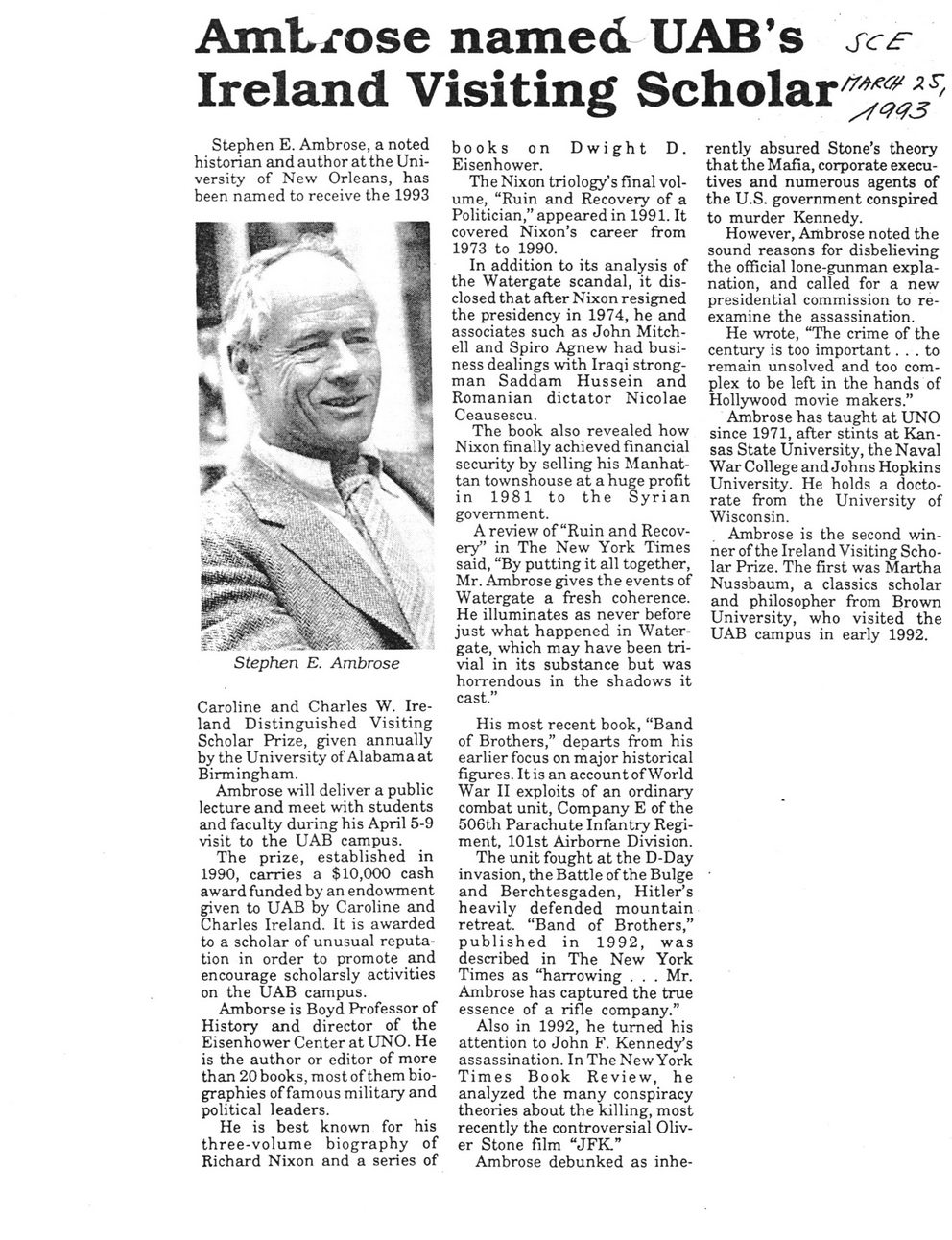This text was obtained via automated optical character recognition.
It has not been edited and may therefore contain several errors.
Ambrose named UAB?s sc* Ireland Visiting Scholar^r^ Stephen E. Ambrose, a noted historian and author at the University of New Orleans, has been named to receive the 1993 Stephen E. Ambrose Caroline and Charles W. Ireland Distinguished Visiting Scholar Prize, given annually by the University of Alabama at Birmingham. Ambrose will deliver a public lecture and meet with students and faculty during his April 5-9 visit to the UAB campus. The prize, established in 1990, carries a $10,000 cash award funded by an endowment given to UAB by Caroline and Charles Ireland. It is awarded to a scholar of unusual reputation in order to promote and encourage scholarsly activities on the UAB campus. Amborse is Boyd Professor of History and director of the Eisenhower Center at UNO. He is the author or editor of more than 20 books, most of them biographies of famous military and political leaders. He is best known for his three-volume biography of Richard Nixon and a series of books on Dwight D. Eisenhower. The Nixon triology?s final volume, ?Ruin and Recovery of a Politician,? appeared in 1991. It covered Nixon?s career from 1973 to 1990. In addition to its analysis of the Watergate scandal, it disclosed that after Nixon resigned the presidency in 1974, he and associates such as John Mitchell and Spiro Agnew had business dealings with Iraqi strongman Saddam Hussein and Romanian dictator Nicolae Ceausescu. The book also revealed how Nixon finally achieved financial security by selling his Manhattan townshouse at a huge profit in 1981 to the Syrian government. A review of ?Ruin and Recovery? in The New York Times said, ?By putting it all together, Mr. Ambrose gives the events of Watergate a fresh coherence. He illuminates as never before just what happened in Watergate, which may have been trivial in its substance but was horrendous in the shadows it cast.? His most recent book, ?Band of Brothers,? departs from his earlier focus on major historical figures. It is an account of World War II exploits of an ordinary combat unit, Company E of the 506th Parachute Infantry Regiment, 101st Airborne Division. The unit fought at the D-Day invasion, the Battle of the Bulge and Berchtesgaden, Hitler?s heavily defended mountain retreat. ?Band of Brothers,? published in 1992, was described in The New York Times as ?harrowing . . . Mr. Ambrose has captured the true essence of a rifle company.? Also in 1992, he turned his attention to John F. Kennedy?s assassination. In The New York Times Book Review, he analyzed the many conspiracy theories about the killing, most recently the controversial Oliver Stone film ?JFK? Ambrose debunked as inhe- rently absured Stone?s theory that the Mafia, corporate executives and numerous agents of the U.S. government conspired to murder Kennedy. However, Ambrose noted the sound reasons for disbelieving the official lone-gunman explanation, and called for a new presidential commission to reexamine the assassination. He wrote, ?The crime of the century is too important... to remain unsolved and too complex to be left in the hands of Hollywood movie makers.? Ambrose has taught at UNO since 1971, after stints at Kansas State University, the Naval War College and Johns Hopkins University. He holds a doctorate from the University of Wisconsin. Ambrose is the second winner of the Ireland Visiting Scholar Prize. The first was Martha Nussbaum, a classics scholar and philosopher from Brown University, who visited the UAB campus in early 1992.

Ambrose, Stephen Echo-3-25-93